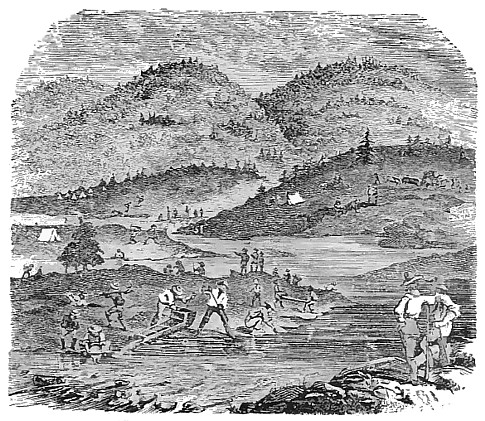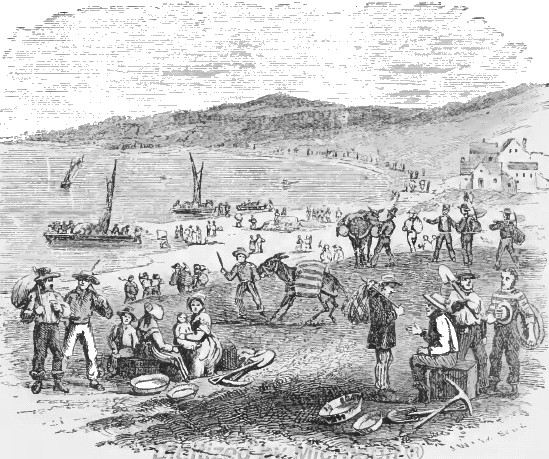The town of Placerville or Hangtown, as it was commonly called during the California Gold Rush, consisted of one long straggling street of clapboard houses and log cabins, built in a hollow at the side of a creek, and surrounded by high and steep hills. The diggings here had been exceedingly rich men used to pick the chunks of gold out of the crevices of the rocks in the ravines with no other tool than a bowie-knife; but these days had passed, and now the whole surface of the surrounding country showed the amount of real hard work which had been done. The beds of the numerous ravines which wrinkle the faces of the hills, the bed of the creek, and all the little flats alongside of it, were a confused mass of heaps of dirt and piles of stones lying around the innumerable holes, about six feet square and five or six feet deep, from which they had been thrown out.
The original course of the creek was completely obliterated, its waters being distributed into numberless little ditches, and from them conducted into the "long toms" of the miners through canvas hoses, looking like immensely long slimy sea-serpents. The number of bare stumps of what had once been gigantic pine trees, dotted over the naked hill-sides surrounding the town, showed how freely the axe had been used, and to what purpose was apparent in the extent of the town itself, and in the numerous log cabins scattered over the hills, in situations apparently chosen at the caprice of the owners, but in reality with a view to be near to their diggings, and at the same time to be within a convenient distance of water and firewood.
Along the whole length of the creek, as far as one could see, on the banks of the creek, in the ravines, in the middle of the principal and only street of the town, and even inside some of the houses, were parties of miners, numbering from three or four to a dozen, all hard at work, some laying into it with picks, some shoveling the dirt into the "long toms," or with long handled shovels washing the gold bearing dirt thrown in, and throwing out the stones, while others were working pumps or baling water out of the holes with buckets. There was a continual noise and clatter, as mud, dirt, stones, and water were thrown about in all directions; and the men, dressed in ragged clothes and big boots, wielding picks and shovels, and rolling big rocks about, were all working as if for their lives, going into it with a will, and a degree of energy, not usually seen among laboring men. It was altogether a scene which conveyed the idea of hard work in the fullest sense of the words, and in comparison with which a gang of railway navies would have seemed to be merely a party of gentlemen amateurs playing at working pour passer le temps.
A stroll through the village revealed the extent to which the ordinary comforts of life were attainable. The gambling-houses, of which there were three or four, were of course the largest and most conspicuous buildings; their mirrors, chandeliers, and other decorations, suggesting a style of life totally at variance with the outward indications of everything around them. The street itself was in many places knee-deep in mud, and was plentifully strewed with old boots, hats, and shirts, old sardine-boxes, empty tins of preserved oysters, empty bottles, worn-out pots and kettles, old ham-bones, broken picks and shovels, and other rubbish too various to particularize. Here and there, in the middle of the street, was a square hole about six feet deep, in which one miner was digging, while another was baling the water out with a bucket, and a third, sitting alongside the heap of dirt which had been dug up, was washing it in a rocker. Wagons, drawn by six or eight mules or oxen, were navigating along the street, or discharging their strangely-assorted cargoes at the various stores; and men in picturesque rags, with large muddy boots, long beards, and brown faces, were the only inhabitants to be seen.
There were boarding-houses on the table-d'hote principle, in each of which forty or fifty hungry miners sat down three times a day to an oil cloth covered table, and in the course of about three minutes surfeited themselves on salt pork, greasy steaks, and pickles. There were also two or three "hotels," where much the same sort of fare was to be had, with the extra luxuries of a table-cloth and a superior quality of knives and forks. The stores were curious places. There was no specialty about them everything was to be found in them which it could be supposed that any one could possibly want, excepting fresh beef (there was a butcher who monopolized the sale of that article). On entering a store, one would find the storekeeper in much the same style of costume as the miners, very probably sitting on an empty keg at a rickety little table, playing "seven up" for "the liquor" with one of his customers.
The counter served also the purpose of a bar, and behind it was the usual array of bottles and decanters, while on shelves above them was an ornamental display of boxes of sardines, and brightly-colored tins of preserved meats and vegetables with showy labels, interspersed with bottles of champagne and strangely shaped bottles of exceedingly green pickles, the whole being arranged with some degree of taste. Goods and provisions of every description were stowed away promiscuously all round the store, in the middle of which was invariably a small table with a bench, or some empty boxes and barrels for the miners to sit on while they played cards, spent their money in brandy and oysters, and occasionally got drunk.
During the week, and especially when the miners were all at work, Hangtown was comparatively quiet; but on Sundays it was a very different place. On that day the miners living within eight or ten miles all flocked in to buy provisions for the week to spend their money in the gambling-rooms to play cards to get their letters from home and to refresh themselves, after a week's labor and isolation in the mountains, in enjoying the excitement of the scene according to their tastes. The gamblers on Sundays reaped a rich harvest; their tables were thronged with crowds of miners, betting eagerly, and of course losing their money. Many men came in, Sunday after Sunday, and gambled off all the gold they had dug during the week, having to get credit at a store for their next week's provisions, and returning to their diggings to work for six days in getting more gold, which would all be transferred the next Sunday to the gamblers, in the vain hope of recovering what had been already lost.
The storekeepers did more business on Sundays than in all the rest of the week ; and in the afternoon crowds of miners could be seen dispersing over the hills in every direction, laden with the provisions they had been purchasing, chiefly flour, pork and beans, and perhaps a lump of fresh beef. There was only one place of public worship in Hangtown at that time, a very neat little wooden edifice, which belonged to some denomination of Methodists, and seemed to be well attended. There was also a newspaper published two or three times a week, which kept the inhabitants "posted up" as to what was going on in the world.
I met a San Francisco friend in Hangtown practicing his profession as a doctor, who very hospitably offered me quarters in his cabin, which I gladly accepted. The accommodation was not very luxurious, being merely six feet of the floor on which to spread my blankets. My host, however, had no better bed himself, and indeed it was as much as most men cared about. Those who were very particular preferred sleeping on a table or a bench when they were to be had; bunks and shelves were also much in fashion; but the difference in comfort was a mere matter of imagination, for mattresses were not known, and an earthen floor was quite as soft as any wooden board. Three or four miners were also inmates of the doctor's cabin. They were quondam New South Wales squatters, who had been mining for several months in a distant part of the country, and were now going to work a claim about two miles up the creek from Hangtown. As they wanted another hand to work their long tom with them, I very readily joined their party. For several days we worked this place, trudging out to it when it was hardly daylight, taking with us our dinner, which consisted of beefsteaks and bread, and returning to Hangtown about dark; but the claim did not prove rich enough to satisfy us, so we abandoned it, and went "prospecting," which means looking about for a more likely place.
Return To The Main Page: California Gold Rush: True Tales of the 49ers


